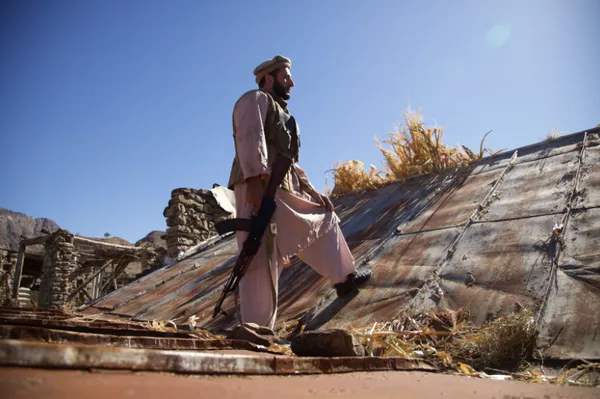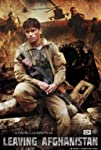Eye For Film >> Movies >> Battle For Afghanistan (2019) Film Review
Battle For Afghanistan
Reviewed by: Andrew Robertson

The Soviets are leaving, but the country is staying with them. In the same way that Apocalypse Now is about a trip on a boat, Battle For Afghanistan is framed by efforts to recover a downed pilot. Ostensibly based on a true story, it is as hard to judge what is fictive and what is realistic in the same way that it is hard to judge the differences between Rescue Dawn and Little Dieter Wants To Fly.
It is no less good for that uncertainty. Indeed, in and among some gripping action sequences there are questions asked about war and its conduct, and those who conduct it. It extends to the title. Battle For Afghanistan, Leaving Afghanistan, and also Brotherhood. There's also three writing credits, father and son Pavel and Aleksandr Lungin, and then the author of the memoirs upon which this is based. Nikolay Dmitrievich Kovalyov did spend time in Afghanistan, but his war story is different than most. Anthony Swofford's Jarhead didn't get its title changed. Gustav Hasford's Short-Timers influenced Full Metal Jacket. Nikolay's time in Afghanistan was a footnote in his ascent to becoming the head of the FSB, before that role was taken by Putin.
What We Left Unfinished explores some of the compromises engendered by state sponsorship in a time of turmoil, and whatever this film is called it is no different. There are armoured personnel carriers, tanks, helicopters, and difficult lines found in the sand around all of them. Some soldiers are heroic, some are craven capitalists, others are driven by desire, revenge, lust, greed, your superfecta of non-motherland motivations. The Afghans have similarly mixed goals, from the often craven and sectarian government to the individual warlords and Mujahideen, many of whom have even more complicated ties to the Soviets.
There are some astonishing set pieces, including a brutal raid on a compound that starts with a BTR- of some stripe smashing through a wall. I'm not certain of the exact model because they all look alike and the turret was obfuscated by debris. In other shots the iconic Russian tankoviy, infantry riding to attack atop those armoured hulls. This is end of empire malaise, however, last days of Hanoi with fewer helicopters. The soldiery are in a mix of blue stripes and sports casual, leather jackets and looping curls of smoke.
It is the past, so cigarettes are commonplace. Almost as much as Kalashnikovs and their derivatives, and a ubiquity of violence. Unrelenting too. Splashes onto screens, the rumble of artillery, bombs, that high skirl used to convey detonation deafness. The birds above the mountains just fly.
The opening scenes serve to introduce the bulk of the characters. A caravan stop that is itself stopped, higher command in a small bus. Not quite a commissar's charabanc but at once as archaic and anachronistic. Then a young boy in the mountains, a jet overhead pursued by a missile. Within the argot of MANPADS and Stingers the whiff of Argo and other CIA interventions. In and amongst the withdrawal we are following an intelligence team of sorts, a reconnaissance unit, the 108th Motor Rifle Division and the assembled might of the USSR. A new lieutenant breaks up a fight over cigarettes and girly mags, but how those came to be in the hands they did is even more complicated.
There's mention of other special units, the costs of war and of profiteering. The are some moments of real beauty, the verticalities of the landscape and the corresponding closeness of the horizons. Some of the destruction is gorgeous. The aftermaths of a variety of ambushed convoys are writ in fire and more. One chase recalls the headlight highlighted hunting of Wake In Fright, others different tales of man's inhumanity. In the end it amounts to a tragedy, one undermined by a coda that seems intent on pulling a good result from the mire.
There are some strong performances, good chemistries between the assembled crews. Anton Momot (the Greek) and Aleksandr Kuznetsov (Laryok) both have a particular charisma. Timofei Parshikov as an embedded filmmaker provides opportunities for diegetic shaky-cam in a film that's more than willing to play with format and presentation. There are no flashbacks, exposition is masked by new arrivals and fresh complexities. File footage in the opening credits is unflinching around casualties, fatalities, and what follows does so unblinkingly.
At nearly two hours it does drag a bit, but in part that's because it's less a single story than a series of linked vignettes. Amongst ambushes, raids, helicopter assaults, there are quieter moments of bakshish and black marketeering, discussions of home and leave and leaving home. While entertaining, at times beautifully shot, it feels at times like its focus is lost. The version Eye For Film saw was relatively well subtitled, no mean feat with language as given to poesy and idiom as Russian. There's the odd error probably borne of homophones or similar, but meaning is usually clear. Some sections go undocumented, Pashtun is not always translated and sometimes the translations aren't either. That means we spend a lot of the film trying to figure out what's being said, and, in the context of politics, what's being said.
It is perhaps unsurprising in a film co-written by a father and son that relationships of that kind are important. The pilot's father is a general. The shepherd boy's father is a mujahideen. Everyone else is father or son or groom with intent to change state or more. There are almost no women. There's a photograph of one and it's discussed enough that in the flesh she counts double. The Soviet army is diverse, the Afghans too, but meditations on martial masculinity feel tempered by the diktats of realpolitik.
In Hearts Of Darkness we discovered that at some points Colonel Kilgore's helicopters were dispatched to actual fighting. In What We Left Unfinished a film about one coup was interrupted by another. Here the realities of modern Russia mean that a film exploring what was happening when an older Russia left Afghanistan is compromised in its reality. It does have the grit and grime of authenticity, but effects, however special, are not truth.
As a document of a reflection of a moment in time, it says as much about when it was filmed as when it is set. Though it entertains, at times the discomfort it creates might be unintentional. Being based on an apparatchik's memoirs guarantees that it is not the whole story. That it feels in places incomplete can perhaps be laid at the film-makers' feet. As with a drunkard in a minefield, its stumbling might be unintentional but it was not accident that created those circumstances.
Reviewed on: 10 Aug 2021
















